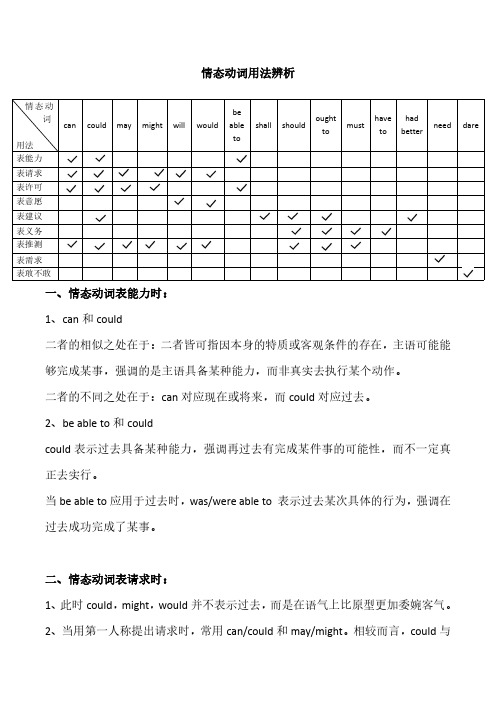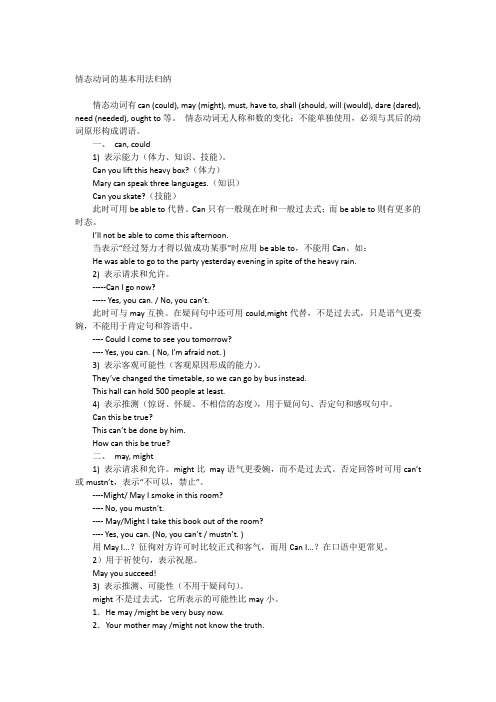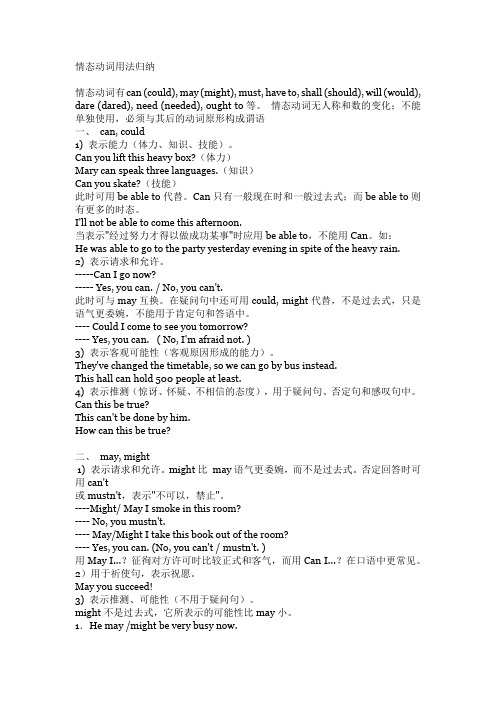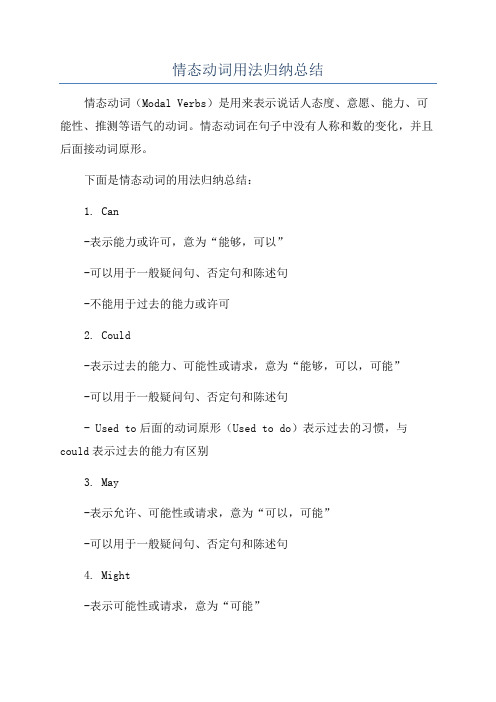情态动词的归纳
情态动词的基本用法归纳

情态动词的基本用法归纳情态动词有can(could),may(might),must,haveto,shall(should,will(would),dare(dared),n eed(needed),oughtto等。
情态动词无人称和数的变化;不能单独使用,必须与其后的动词原形构成谓语。
一、can,could1)表示能力(体力、知识、技能)。
Canyouliftthisheavybox?(体力)Marycanspeakthreelanguages.(知识)Canyouskate?(技能)此时可用beableto代替。
Can只有一般现在时和一般过去式;而beableto则有更多的时态。
I’llnotbeabletocomethisafternoon.当表示“经过努力才得以做成功某事”时应用beableto,不能用Can。
如:Hewasabletogotothepartyyesterdayeveninginspiteoftheheavyrain.2)表示请求和允许。
-----CanIgonow?-----Yes,youcan./No,y oucan’t.此时可与may互换。
在疑问句中还可用could,might代替,不是过去式,只是语气更委婉,不能用于肯定句和答语中。
----CouldIcometoseeyoutomorrow?----Yes,youcan.(No,I’mafraidnot.)3)表示客观可能性(客观原因形成的能力)。
They’vechangedthetimetable,sowecangobybusinstead.Thishallcanhold500peopleatleast.4)表示推测(惊讶、怀疑、不相信的态度),用于疑问句、否定句和感叹句中。
Canthisbetrue?Thiscan’tbedonebyhim.Howcanthisbetrue?二、may,might1)表示请求和允许。
情态动词归纳

情态动词情态动词是一种本身有一定的词义,但要与动词原形一起使用,给谓语动词增添情态色彩,表示说话人对有关行为或事物的态度和看法,认为其可能、应该或必要等。
情态动词后面加动词原形。
主要有14个can/could,may/might,will/would,shall/should,must,ought to,dare/dared,need,used to;一.情态动词的用法:常用的情态动词有can,may,must,need,should, had better.1. can的用法:①表示能力“能,会”eg: He can speak a little Japanese.他会说一点日语。
②表示请求或许可“可以”eg: Can I help you? 要我帮忙吗?③表示猜测“可能”eg: Where can she go now? 她可能到哪里去了呢?could用来表示请求时,语气委婉,主要用于疑问句,不能用于肯定句,答语应用can(即:could不能用于现在时态的简略答语中)。
如:——Could I use your dictionary?——Yes, you can.(否定回答可用:No, I’m afraid not.)can和be able to辨析can(could)和be able to都可以表示能力,意思上没有区别。
但can只有现在式和过去式,而be able to则有更多的形式。
如:I’ve always wanted to able to speak fluent English.Those bags look really heavy, are you sure you’ll be able to carry them on your own?但是,表示在过去某时的某一场合经过一番努力,终于做成了某事,通常不用could,而用was/were able to来表示。
这时,was/were able to相当于managed to do或succeed in doing。
情态动词用法归纳总结

情态动词用法辨析情态动词用法can could may might will would be able to shall should ought to must have to had better need dare表能力表请求表许可表意愿表建议表义务表推测表需求表敢不敢一、情态动词表能力时:1、can 和could二者的相似之处在于:二者皆可指因本身的特质或客观条件的存在,主语可能能够完成某事,强调的是主语具备某种能力,而非真实去执行某个动作。
二者的不同之处在于:can 对应现在或将来,而could 对应过去。
2、be able to 和couldcould 表示过去具备某种能力,强调再过去有完成某件事的可能性,而不一定真正去实行。
当be able to 应用于过去时,was/were able to 表示过去某次具体的行为,强调在过去成功完成了某事。
二、情态动词表请求时:1、此时could ,might ,would 并不表示过去,而是在语气上比原型更加委婉客气。
2、当用第一人称提出请求时,常用can/could 和may/might 。
相较而言,could 与may在表请求的问句中出现的频率最高;might表发请求的语气最为委婉客气,因此反而很少见;而can则常用于熟人间的对话中。
语气强度:can>could/might>might3、当用第二人称提出请求时,常用can/could和will/would。
其中could和would 表达请求的语气更委婉客气;而can与will则常用于熟人对话中。
语气强度:can/will>could/would三、情态动词表许可时:1、与表请求不同,will/would不论前接第几人称,都表示主语本身的意愿,无需得到他人的“许可”,所以will/would不可以用于表请求的句中。
2、can和may二者都可以表示对现在或将来动作的许可,其中can的使用频率更高。
情态动词有哪些 用法归纳及口诀

情态动词有哪些用法归纳及口诀
情态动词是英语中很重要的一类动词,暗含着说话者的态度,因此掌握好情态动词,对于把握说话者的意图,思想有着重要的作用。
现在总结如下。
1 情态动词四大分类①只做情态动词:may, might, must..
②可做情态动词又可做实义动词:如:need, dare,can.......
③具有情态动词特征:have(had,has) to,used to, ought to
④可做情态动词又可作助动词:如:shall(should),will(would)
注意
mustn’t代表强烈禁止must 表示主观,have to 表示客观。
美式英语中常用must not 而不用mustn’t.mayn’t,mightn’t和shan’t也很少
用
常用
can (could), may (might), must, need, ought to, dare (dared), shall (should), will
(would)
1 英语情态动词用法顺口溜情态动词要记牢;动词原形来跟梢。
不管人称单复数;现在过去乐逍遥。
can 表能力和许可;也许可能may 来表;
必须一定must;should 应该来报到。
英语情态动词用法顺口溜
回答不须needn’t;mustn’t 为不必要。
情态动词用法归纳(全)

考点一 can ,may, must 等情态动词在陈述句中的用法
1. can 的用法 (1)表示能力、许可、可能性。 表示能力时一般译为‚能、会‛, 即 有种能力,尤其是生来具备的能力,此时may 和must 均不可代替它。 如: She can swim fast, but I can’t . 她能游得很快,但我不能。 I can see with my eyes. 我用眼睛看。 (2) 表示可能、能够。 如: I can finish it in an hour. 我能在一小时后完成它。 (3)表示许可,常在口语中。如: You can use my dictionary. 你可以用我的字典。 (4) 表示推测,意为‚可能‛, 常用于否定句和疑问句中, 此时 can’t 译为‚ 不可能‛。 如: Can the news be true? 这个消息会是真的吗? ----Can it be our teacher? 那个人有可能是我们老师吗? ----No, it can’t be our teacher. He is on a visit to the Great Wall.
2. could的用法
(1)can的过去式, 意为‚ 能、 会‛ , 表示过去的能力。 如: He could write poems when he was 10. 他十岁时就会 写诗。
(2)could 在疑问句中, 表示委婉的语气, 此时 could 没 有过去式的意思。如: Could you do me a favour? 你能帮我个忙吗? ---Could I use your pen? 我能用一下你的钢笔吗? --Yes, you can. 可以。
1. You’re Tom’s good friend, so you must know what he likes best. 2. Your mother must be waiting for you now.
情态动词的基本用法归纳

情态动词的基本用法归纳情态动词有can (could), may (might), must, have to, shall (should, will (would), dare (dared), need (needed), ought to等。
情态动词无人称和数的变化;不能单独使用,必须与其后的动词原形构成谓语。
一、can, could1) 表示能力(体力、知识、技能)。
Can you lift this heavy box?(体力)Mary can speak three languages.(知识)Can you skate?(技能)此时可用be able to代替。
Can只有一般现在时和一般过去式;而be able to则有更多的时态。
I’ll not be able to come this afternoon.当表示“经过努力才得以做成功某事”时应用be able to,不能用Can。
如:He was able to go to the party yesterday evening in spite of the heavy rain.2) 表示请求和允许。
-----Can I go now?----- Yes, you can. / No, you can’t.此时可与may互换。
在疑问句中还可用could,might代替,不是过去式,只是语气更委婉,不能用于肯定句和答语中。
---- Could I come to see you tomorrow?---- Yes, you can. ( No, I’m afraid not. )3) 表示客观可能性(客观原因形成的能力)。
T hey’ve changed the timetable, so we can go by bus instead.This hall can hold 500 people at least.4) 表示推测(惊讶、怀疑、不相信的态度),用于疑问句、否定句和感叹句中。
高中情态动词归纳

情态动词用法归纳情态动词有can (could), may (might), must, have to, shall (should, will (would), dare (dared), need (needed), ought to等。
情态动词无人称和数的变化;不能单独使用,必须与其后的动词原形构成谓语一、can, could1) 表示能力(体力、知识、技能)。
Can you lift this heavy box?(体力)Mary can speak three languages.(知识)Can you skate?(技能)此时可用be able to代替。
Can只有一般现在时和一般过去式;而be able to则有更多的时态。
I’ll not be able to come this afternoon.当表示“经过努力才得以做成功某事”时应用be able to,不能用Can。
如:He was able to go to the party yesterday evening in spite of the heavy rain.2) 表示请求和允许。
-----Can I go now?----- Yes, you can. / No, you can’t.此时可与may互换。
在疑问句中还可用could, might代替,不是过去式,只是语气更委婉,不能用于肯定句和答语中。
---- Could I come to see you tomorrow?---- Yes, you can. ( No, I’m afraid not. )3) 表示客观可能性(客观原因形成的能力)。
They’ve changed the time table, so we can go by bus instead.This hall can hold 500 people at least.4) 表示推测(惊讶、怀疑、不相信的态度),用于疑问句、否定句和感叹句中。
情态动词用法归纳(全)

6.
dare 的用法
dare意为“敢、敢于”, 用法近似于need, 有两种词性: (1 ) dare 作为情态动词,多用于否定句、疑问句或条件句中, 无第三人称单数形式,只有一般现在时和一般过去时。 如: Dare he tell them what he knows? 他敢告诉他们所知道的情况吗? I daren’t ask her – will you do it for me? 我可不敢问她,你能帮我问问吗? (2 ) dare 作为实义动词,此时有人称、数及时态的变化。如: He doesn’t dare to break his promise. 他不敢食言。 注意: 在口语中,dare 的各种形式常与不带to 的不定式连用。如: Do you dare tell her what I said? 你敢告诉她我说的话吗? I didn’t dare look at him. 我不敢看他。
2.
will, would, shall 的用法 (1) will 在一般疑问句中表示客气的“请求、劝 说”。 would 是will 的过去式,语气更加客气、委婉。 如: Would you show me your picture book? 你能让我看看 你的画册吗? Will you please give me a call? 请给我打个电话好吗?
(2)对 may 引出的问句,可以有下列回答方式: Yes, of course. Yes, certainly. Sure . No, you mustn’t. No, you can’t.
(3)对must引出的疑问句,回答方式为: Yes, …must. No,… needn’t/ don’t have to.
3. may的用法
情态动词的基本用法归纳

情态动词的基本用法归纳情态动词有can (could), may (might), must, have to, shall (should, will (would), dare (dared), need (needed), ought to等。
情态动词无人称和数的变化;不能单独使用,必须与其后的动词原形构成谓语。
一、can, could1) 表示能力(体力、知识、技能)。
Can you lift this heavy box?(体力)Mary can speak three languages.(知识)Can you skate?(技能)此时可用be able to代替。
Can只有一般现在时和一般过去式;而be able to则有更多的时态。
I’ll not be able to come this afternoon.当表示“经过努力才得以做成功某事”时应用be able to,不能用Can。
如:He was able to go to the party yesterday evening in spite of the heavy rain.2) 表示请求和允许。
-----Can I go now?----- Yes, you can. / No, you can’t.此时可与may互换。
在疑问句中还可用could,might代替,不是过去式,只是语气更委婉,不能用于肯定句和答语中。
---- Could I come to see you tomorrow?---- Yes, you can. ( No, I’m afraid not. )3) 表示客观可能性(客观原因形成的能力)。
T hey’ve changed the timetable, so we can go by bus instead.This hall can hold 500 people at least.4) 表示推测(惊讶、怀疑、不相信的态度),用于疑问句、否定句和感叹句中。
情态动词的用法归纳 情态动词有哪些

情态动词的用法归纳情态动词有哪些
情态动词有can,may,must,have to,shall,will,dare,need,ought to 等。
情态动词无人称和数的变化;不能单独使用,必须与其后的动词原形构成谓语。
1 英语情态动词的基本用法归纳一、can, could
1) 表示能力(体力、知识、技能)。
Can you lift this heavy box?(体力)
Mary can speak three languages.(知识)
Can you skate?(技能)
此时可用be able to 代替。
Can 只有一般现在时和一般过去式;而be able to 则有更多的时态。
I’ll not be able to come this afternoon.
当表示“经过努力才得以做成功某事”时应用be able to,不能用Can。
如:
He was able to go to the party yesterday evening in spite of the heavy rain. 2) 表示请求和允许。
-----Can I go now?
----- Yes, you can. / No, you can’t.
此时可与may 互换。
在疑问句中还可用could,might 代替,不是过去式,只
是语气更委婉,不能用于肯定句和答语中。
---- Could I come to see you tomorrow?
---- Yes, you can. ( No, I’m afraid not. )
3) 表示客观可能性(客观原因形成的能力)。
情态动词用法归纳总结

情态动词用法归纳总结情态动词是一类用来表示说话人的态度、观点和意愿的动词,具有一定的语法特点。
以下是情态动词的一些常见用法归纳总结:1.表示能力、可能性和推测:- Can: 表示能力和可能性,用于肯定句;例如:“I can swim.”(我会游泳。
)- Could: 表示能力和可能性,用于疑问句和否定句;例如:“Could you help me?”(你能帮助我吗?)- May/might: 表示可能性和推测;例如:“He may be busy.”(他可能很忙。
)- Must: 表示强烈的推测或肯定;例如:“He must be tired.”(他一定很累。
)2.表示许可和建议:- Can: 表示允许和禁止,用于肯定句;例如:“You can go now.”(你现在可以走了。
)- Could: 表示请求允许,用于疑问句和否定句;例如:“Could I borrow your pen?”(我可以借用你的笔吗?)- May/might: 表示请求允许;例如:“May I use your phone?”(我可以用一下你的手机吗?)- Should: 表示建议;例如:“You should eat more vegetables.”(你应该多吃蔬菜。
)3.表示义务和推测:- Must: 表示必须和义务;例如:“You must finish your homework.”(你必须完成作业。
)- Have to: 表示必须和义务;例如:“I have to go to work tomorrow.”(我明天必须去上班。
)4.表示可能性和意愿:- Can: 表示可能性和意愿,用于肯定句;例如:“I can help you with that.”(我可以帮你做那个。
)- Could: 表示可能性和意愿,用于疑问句和否定句;例如:“Could you please pass me the salt?”(请你把盐递给我好吗?)- May/might: 表示可能性和意愿;例如:“I may go to the party tonight.”(今晚我可能会去参加派对。
高考英语情态动词用法归纳

情态动词用法归纳情态动词有can (could), may (might), must, have to, shall (should), will (would), dare (dared), need (needed), ought to等。
情态动词无人称和数的变化;不能单独使用,必须与其后的动词原形构成谓语一、can, could1) 表示能力(体力、知识、技能)。
Can you lift this heavy box?(体力)Mary can speak three languages.(知识)Can you skate?(技能)此时可用be able to代替。
Can只有一般现在时和一般过去式;而be able to则有更多的时态。
I'll not be able to come this afternoon.当表示"经过努力才得以做成功某事"时应用be able to,不能用Can。
如:He was able to go to the party yesterday evening in spite of the heavy rain.2) 表示请求和允许。
-----Can I go now?----- Yes, you can. / No, you can't.此时可与may互换。
在疑问句中还可用could, might代替,不是过去式,只是语气更委婉,不能用于肯定句和答语中。
---- Could I come to see you tomorrow?---- Yes, you can. ( No, I'm afraid not. )3) 表示客观可能性(客观原因形成的能力)。
They've changed the timetable, so we can go by bus instead.This hall can hold 500 people at least.4) 表示推测(惊讶、怀疑、不相信的态度),用于疑问句、否定句和感叹句中。
情态动词用法归纳总结

情态动词用法归纳总结情态动词(Modal Verbs)是用来表示说话人态度、意愿、能力、可能性、推测等语气的动词。
情态动词在句子中没有人称和数的变化,并且后面接动词原形。
下面是情态动词的用法归纳总结:1. Can-表示能力或许可,意为“能够,可以”-可以用于一般疑问句、否定句和陈述句-不能用于过去的能力或许可2. Could-表示过去的能力、可能性或请求,意为“能够,可以,可能”-可以用于一般疑问句、否定句和陈述句- Used to后面的动词原形(Used to do)表示过去的习惯,与could表示过去的能力有区别3. May-表示允许、可能性或请求,意为“可以,可能”-可以用于一般疑问句、否定句和陈述句4. Might-表示可能性或请求,意为“可能”-可以用于一般疑问句、否定句和陈述句5. Must-表示必须、推测或强烈的可能性,意为“必须,一定”-可以用于一般疑问句、否定句和陈述句6. Shall-表示将来的意愿或决定,意为“将,会”- 一般只用于第一人称(I和we)-可以用于一般疑问句、否定句和陈述句7. Should-表示应该、可能性或建议,意为“应该”-可以用于一般疑问句、否定句和陈述句8. Will-表示将来的意愿或决定,意为“将,会”-可以用于一般疑问句、否定句和陈述句9. Would-表示过去的习惯、虚拟语气或请求,意为“将,会,愿意”-可以用于一般疑问句、否定句和陈述句-用于主动语态时表示客气的请求或意愿,用于被动语态时表示过去的习惯10. ought to-表示应该,意为“应该”-用于一般疑问句、否定句和陈述句需要注意的是,情态动词后面的动词一般是不带to的原形形式。
有些情态动词的意思可能会根据上下文有所变化,所以具体使用时还需根据具体情况来判断。
情态动词归纳总结

情态动词归纳总结一.概念表示说话人对所说动作的观点,如需要、可能、意愿、怀疑等。
在形式上,情态动词一般没有人称和数的变化。
有的情态动词没有时态的变化,如must。
情态动词本身词义不完全,不能单独作谓语动词,必须和不带“to”的动词原形连用(即:其后动词必须为动词原形)。
二.常见的情态动词Can, may, must , have to,should, would.(dare , need , ought to )等三.用法1 .can1)表示能力We can speak a little English.2)表示许可Can I go out for a moment?-No,you can’t.3)表示请求Can you help me with my English?2 .mayMay/might既可表示现在的“可能”,也可表示将来的“可能”如:现在的可能:It may/might be true.He may/might be still waiting at the door.将来的可能:He may/might leave tomorrow.He may not/might not leave next week.注:can与may的区别在于:can表示“可能”往往指逻辑上的“可能性”;may表示可能则指事实上的“可能性”,如:Mr Green is in poor health.He can be ill at any ill.(逻辑的可能)Mr Green looks pale. He may be ill.(事实的可能)3.Must表示“必须”(带有命令,敦促的语气)You must read a book before you watch TV.You must be back in ten minutes.4.have to表示“不得不”,“必须”We have to be quiet in the library.注:must与have to有时可互换,但must表示说话人的主观意志和看法,语气比较强烈。
情态动词用法归纳

情态动词用法归纳情态动词表示说话人对动作或状态的各种观点和态度,如需要、猜测、意愿、怀疑等。
有can (could), may (might), must, have to, shall (should, will (would), dare (dared), need (needed), ought to 等。
情态动词无人称和数的变化;不能单独使用,必须与其后的动词原形构成谓语一、 can, could1)表示能力(体力、知识、技能)。
Can you lift this heavy box?(体力)Mary can speak three languages.(知识)Can you skate?(技能)此时可用be able to代替。
Can只有一般现在时和一般过去式;而be able to则有更多的时态。
I’ll not be able to come this afternoon.当表示“经过努力才得以做成功某事”时应用be able to,不能用Can。
He was able to go to the party yesterday evening in spite of the heavy rain.在谈论说话时发生的动作,用can,不用be able to.Look!I can swim.Could经常和动作see,hear,smell,taste,feel,remember,understand等连用。
When we went into the house,we could smell something buring.2)表示请求和允许。
-----Can I go now?----- Yes, you can. / No, you can’t.此时可与may互换。
在疑问句中还可用could, might代替,不是过去式,只是语气更委婉,不能用于肯定句和答语中。
---- Could I come to see you tomorrow?---- Yes, you can. ( No, I’m afraid not. )3)表示客观可能性(客观原因形成的能力)。
初中情态动词知识点归纳

初中情态动词知识点归纳1.情态动词的定义:情态动词是一类特殊的助动词,用来表示说话者对其中一种动作或状态的态度、意愿、能力、推测等。
2.情态动词的特点:a.情态动词本身没有人称和数的变化;b.后面一般不加动词的“s”形式;c.后面直接接动词原形。
3.情态动词的用法:a. 表示能力和可能性:can,could,may,might,shall,should,will,would;b. 表示命令和建议:shall,should,ought to,must;c. 表示义务和必须:must,should,ought to;d. 表示推测和可能性:may,might,could;e. 表示许可和禁止:may,can,mustn't,shouldn't;f. 表示愿望和要求:would like,would rather,should;g. 表示意愿和决心:will,would;h. 表示猜测和推测:could,might。
4.情态动词的否定形式:a. 在情态动词之后加not,构成否定形式,例如:can not,could not,may not,might not,shall not,should not,will not,would not等;b. 能力和意愿的否定形式:cannot,could not,may not,might not,will not,would not。
5.情态动词的疑问形式:b. 以情态动词开头的特殊疑问句:疑问词+情态动词+主语+动词原形,例如:What can she do? Where should we go? Who could help me?6.情态动词的省略:a.在与已知的情况一致时,情态动词可以省略;b. 在直接接不定式的情态动词后,可以省略to。
7.典型的情态动词搭配:a. can/could: 表示能力和可能性,例如:I can swim. He could play the piano when he was young.c. must: 表示推测和肯定,例如:She must be at home. You must be tired after such a long journey.d. should: 表示建议和应该,例如:You should study hard. She should go to bed early.e. will/would: 表示意愿和将要,例如:I will help you. He would like to go to the park.以上是初中情态动词的知识点归纳。
情态动词用法归纳(全)

例 --- I think Miss Gao must be in the library. She said she would go there. ----- No. She __ be there, I have just been there. A.can’t B.mustn’t C.needn’t D.wouldn’t
六、 will, would
1) 表示请求、建议等,would更委婉。 Will / Would you pass me the ball, please? 2) 表示意志、愿望和决心。 1. I will never do that again. 2. They asked him if he would go abroad.
2) shall 用于第二、三人称,表示说话人给对方的命令、警告、 允诺或威胁。 1. You shall fail if you don’t work hard.(警告) 2. He shall have the book when I finish it.(允诺) 3. He shall be punished.(威胁)
2) must是说话人的主观看法, 而have to则强调客观需要。 Must只有一般现在时, have to 有更多的时态形式。 1. I really must go now. 2. I had to work when I was your age.
三、 must, have to
3) 表示推测、可能性(只用于肯定的陈述句)
1. You’re Tom’s good friend, so you must know what he likes best. 2. Your mother must be waiting for you now.
- 1、下载文档前请自行甄别文档内容的完整性,平台不提供额外的编辑、内容补充、找答案等附加服务。
- 2、"仅部分预览"的文档,不可在线预览部分如存在完整性等问题,可反馈申请退款(可完整预览的文档不适用该条件!)。
- 3、如文档侵犯您的权益,请联系客服反馈,我们会尽快为您处理(人工客服工作时间:9:00-18:30)。
情态动词的归纳一、单项选择情态动词1.Students ____ remain in their seats until all the papers have been collected according to the regulation.A.would B.shall C.will D.could【答案】B【解析】【详解】考查情态动词。
句意:学生们必须呆在自己的座位上,直到所有的试卷都被收回。
根据句意,“学生们呆在自己的座位上”是一项规定。
shall 可表示某种规定或义务,用于第二、三人称的句子中。
而其他情态动词无此用法。
故正确答案为B。
2.He is a bad-tempered fellow, but he ________ be quite charming when he wishes. A.shall B.shouldC.can D.must【答案】C【解析】【详解】考查情态动词辨析。
句意:他是个脾气不好的家伙,但当他希望自己有魅力的时候,他可以变得相当可爱。
此处表示“能、可以”,故C项正确。
3.— Excuse me, do you mind if I open the window?— Well, if you __________. I can put on more clothes.A.can B.mayC.must D.shall【答案】C【解析】【详解】考查情态动词。
句意:-不好意思,我把窗户打开你介意吗?- 好吧,如果你必须这么做的话。
我可以多穿点衣服。
A. can能够;B. may可能;C. must一定;必须;D. shall会;将。
must表示偏要,必须要做的事情,故选C。
4.---He was satisfied with the result, wasn't he?---No. It was so difficult that he __________have passed it.A.shouldn't B.mustn'tC.couldn' t D.wouldn't【答案】C【解析】【详解】考查情态动词。
A. shouldn't 不应该;B. mustn't禁止,不允许;C. couldn' t 不可能;D. wouldn't不会。
句意:---他对结果很满意,是吗? ---不。
考试太难了,他不可能通过。
固定结构:couldn' t have done“不可能做某事”,此处是对过去事情有把握的否定推测。
故选C。
【点睛】情态动词+ have done结构:1.“must + have + 过去分词”表示对过去发生的事情或状态进行推测,语气比较坚定,通常只用于肯定句.如:It must have rained last night,for the ground is wet.2.“can / could + have + 过去分词”表示对过去某种情况的怀疑或不确定.can和could一般用于否定句和疑问句,could的语气较can弱.如:He can't have finished the work so soon.3.“may / might + have + 过去分词”表示对已发生的动作或存在的状态进行不肯定的推测,might的语气比may弱一点.这种结构主要用于肯定句和否定句,疑问句改用can或could.如:They may not have known it beforehand.4.“need + have + 过去分词”表示过去做了不必做或不需要做的事情,或过去做某事纯属多余.如:I needn't have bought so much wine—only five people came.5.“should / ought to + have + 过去分词”表示过去本该做某事但没做,其否定式表示过去不该做某事但做了,这种句式含有不满或责备之意,ought to的语气比should强一些.如:You ought to / should have studied harder.你本应该更努力学习的.(但没有)He oughtn't to / shouldn't have done that.他本来就不该做那件事.(可是做了)6.“would + have +过去分词”表示对过去的某种情况进行猜测,或本来要做某事却因某种原因未做成,通常用来说明某一情况,但不像用should或ought to那样含有责备之意.如:I guess the poet would have been about twenty when she wrote her first poem.Another worker wouldn't have acted like that.5.It wasn’t right to me that such near neighbors not know one another.A.could B.wouldC.should D.might【答案】C【解析】【详解】考查情态动词。
句意:对我来说,很不正常,如此近的邻居居然不认识。
A. could可能,能够;B. would将;C. should竟然;D. might可能,也许。
should 作为情态动词,可以用来表示意外、惊喜或者在说话人看来是不可思议的,常常译为"竟会"、"居然",住的这么近的邻居居然不认识。
表示意外,所以答案选C。
【点睛】should的用法1、should 作为情态动词,通常用来表示现在或将来的责任或义务,译作“应该”、“应当”,这时它可以和 ought to, be supposed to 互换使用.例如:You should (= ought to ) tell your mother about it at once.2、should 作为情态动词,可以用在条件状语从句中,表示语气较强的假设,译作“万一”、“竟然”,这时也可将 should 置于从句之首,即将 should 放在主语前面,而省略从属连词 if。
例如:If you should fail to come, ask Mrs Chen to work in your place. (= Should you fail to come, ask Mrs Chen to work in your place. )3、should 作为情态动词,可以表示谦逊、客气、委婉之意,译为“可……”、“倒……”。
例如:I should say that it would be better to try it again.4、should 作为情态动词,可以用来表示意外、惊喜或者在说话人看来是不可思议的.尤其在以 why, who, how 等开头的修辞疑问句或某些感叹句中常常译为“竟会”、“居然”。
例如:How should I know it ? 我怎么会知道这件事?5、should 作为情态动词,可以用来表示有较大可能实现的猜测、推论,通常译为“可能”、“总该……吧”,相当于 be expected to 。
例如:They should be home by now, I think. 我想现在他们总该到家了吧。
6、should 作为情态动词,用在由 so that, for fear that, lest 引导的目的状语从句和 in case (that)引导的条件状语从句中,有“能够”、“可能”、“会”之意。
例如:They got up early so that they should (= could/ might) catch the first bus in time.7、should 作为情态动词,可以用于下列虚拟语气句中:(1)用在表示与将来事实相反的条件状语从句中,构成“ If…… should (do sth)……, …… would/ could/ might (do sth.)…… ”句式。
(2) 用在 suggest (propose), arrange, plan, decide, advise, order, demand, request, desire, insist 等表示“建议”、“要求”、“命令”、“决定”、“安排”、“计划”、“主张”的动词后面接的宾语从句中。
这里的 should 也可以省略。
本句中should 作为情态动词,可以用来表示意外、惊喜或者在说话人看来是不可思议的,常常译为"竟会"、"居然",住的这么近的邻居居然不认识。
表示意外,所以答案选C。
6.The professor warned the students that on no account ________ use mobile phones in his class.A.should they B.they shouldC.dare they D.they dare【答案】A【解析】【详解】考查部分倒装和情态动词。
句意:这位教授警告学生们,在他的课堂上,决不应该使用手机。
on no account意为“决不”,否定词放在句首,句子使用部分倒装,排除B、D项;这里表示应该,故选A。
7.Lack of sleep _______ lead to weakened immunity and memory, and also slow physical growth.A.shall B.must C.should D.can【答案】D【解析】【详解】考查情态动词辨析。
句意:睡眠不足会导致免疫力和记忆力下降,还会减缓身体发育。
A. shall将;B. must必须;C. should应该;D. can会,表示理论上或是逻辑判断上,用can,故选D。
8.would可以表达过去常常做的事,过去习惯发生的动作:Pirates would bury gold in a cave. 海盗们常常把黄金藏在山洞中。
We would take a walk along the river. 我们过去常常沿河散步。
3. would后接like、love、mind等动词,表示要求、邀请、希望或询问,此时不是说过去,而是对现在的询问:Would you like to come to my party? 你愿意来我的派对吗?Would you mind coming with us? 你介意和我们一起吗?比如本题,would 表示婉转的请求,征求对方的意见,故选A。
